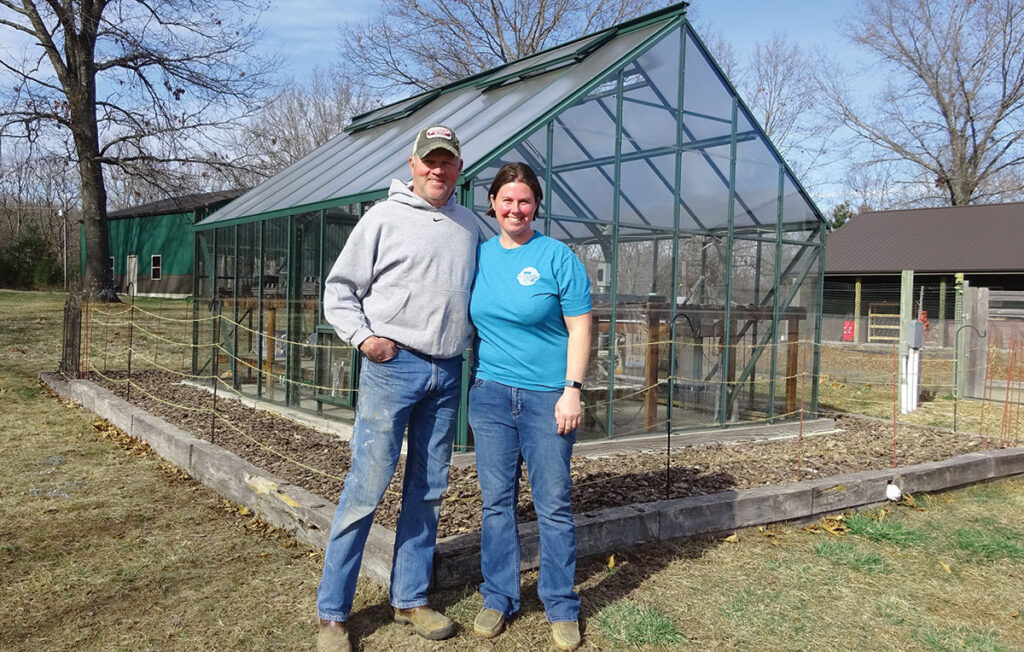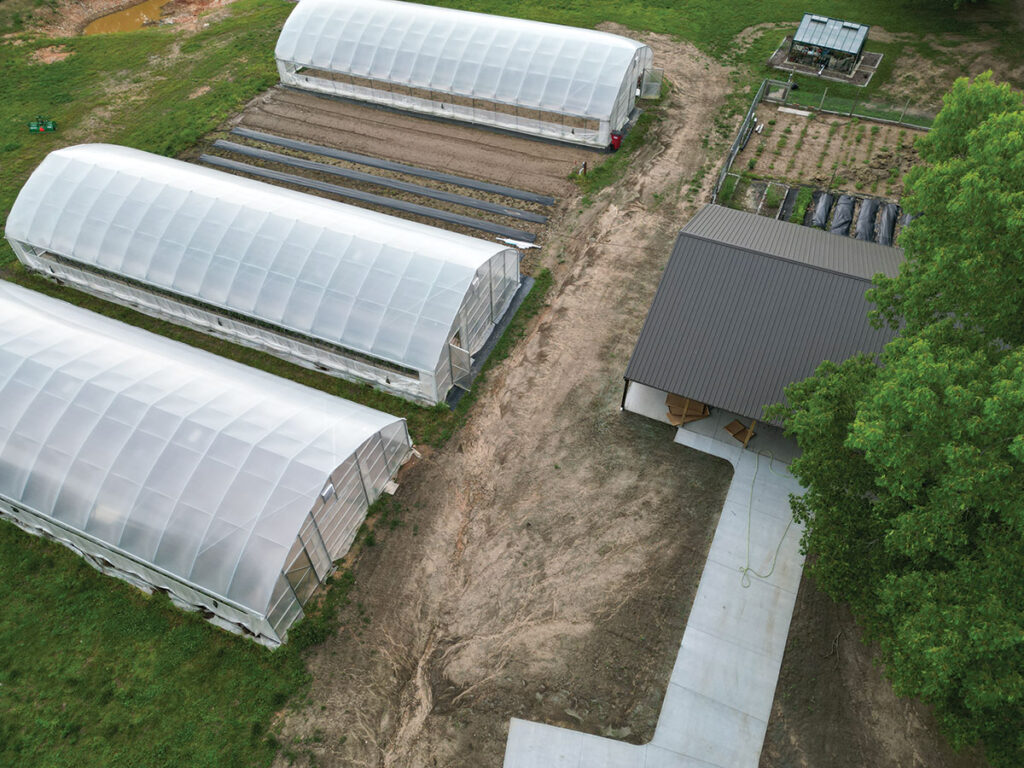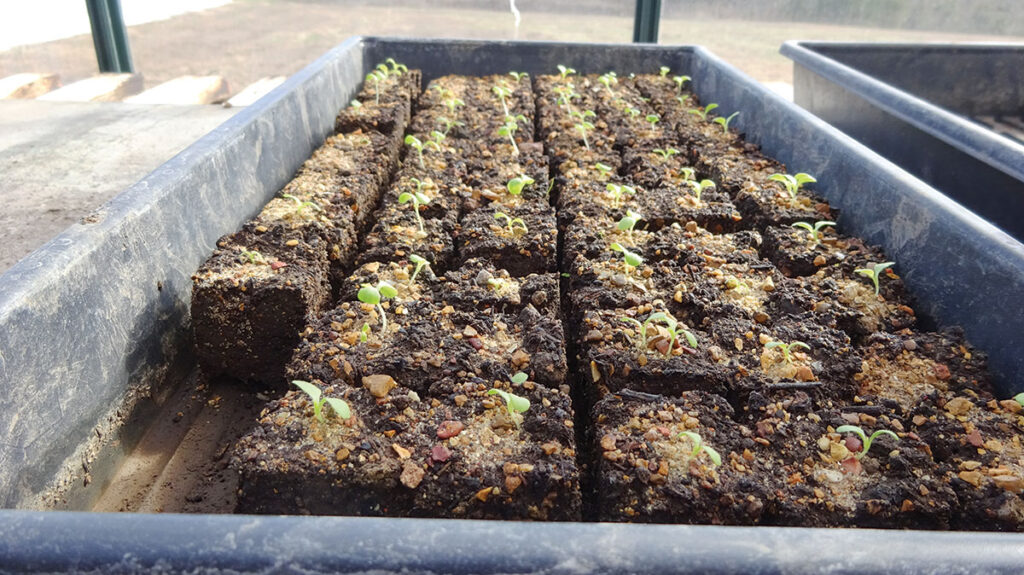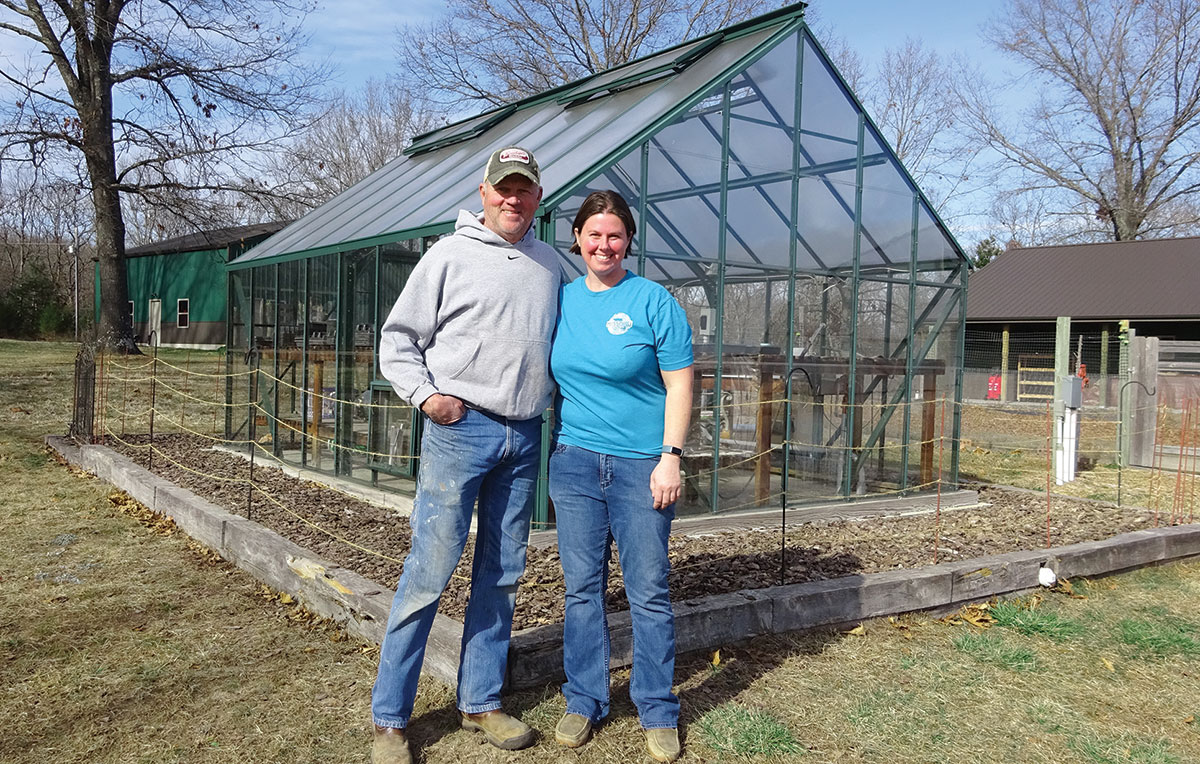
Turtle Gulch provides year-round, fresh produce
BRADLEYVILLE, MO. – Ancel and Melissa Buff grew up in Springfield, Mo. They both graduated from Kickapoo High School in Springfield and Drury College. But they were looking for a change.
“After 40 years of running a construction business, we were looking to get out of the city,” Ancel said.
After considerable searching, they settled on in their pursuit of a more rural lifestyle was a 60-acre farm just east of Bradleyville, Mo.
On their new land, the Buffs started gardening for their own consumption.
Their original idea for a home garden, however, quickly grew organically, one might, say into a modest commercial operation. Their personal garden was so prolific they couldn’t consume or give away all their harvest, so they began selling their excess out of a couple of coolers on folding tables in a parking lot in Bradleyville.
“It wasn’t that we had the intent to start commercial farming,” Melissa said.
“We’re glorified gardeners, just on a bigger scale than most people,” mused Ancel.
When people first encounter the Buffs and find they grow a variety of fresh vegetable in the middle of winter in southern Missouri, they are puzzled.
“They look at you like that’s the craziest thing they ever heard of,” Ancel said. One of the things the Buffs stress is that people can grow their own produce year round once they get into the rhythm and methods of structure protected gardening.
“It’s not that overwhelming,” Ancel noted.
“It’s also educational for some folks,” Melissa said. “You can’t grow everything, but it can be done year-round.”

Ancel spoke to their in-ground method versus hydroponics, which is a rather expensive approach compared to the Turtle Gulch methods.
“This is pretty much how your grandma did it,” Ancel said. “It’s just figuring out how to do it in the middle of winter.”
That is not to say they didn’t make substantial investments because they did, but they planned and built on an order of magnitude that allows the Buffs to cultivate their gardens successfully with only the two of them.
Three years ago, the Buffs turned a small building in Bradleyville they purchased several years earlier into a commercial market and sandwich shop. Aside from seasonally-fresh produce, they sell a limited but savory menu of soups and sandwiches, farm eggs from one of their employees, local honey produced by Hoot Owl Lane Bees, and a variety of jams, jellies, salsa, pickled items, fruit butters, and more.
As of December, Turtle Gulch Gardens is growing bok choy, broccoli, brussels sprouts, cabbage, carrots, cauliflower, collard greens, kale, turnips, radishes, spinach and lettuce.
“We always have lettuce,” Acel said.
They continually turn over the harvested lettuce areas, but growing cycles are different depending on the time of year.
“In the summer, you can get from seed to harvest in about six weeks,” Melissa said. “Right now, in this time of year it takes about three months.”
That is due to the shorter daylight hours during the winter months. This period is commonly known as the Persephone days; a term coined by Eliot Coleman, an 85-year-old American practicing proponent of organic farming, author, researcher and educator.

All the Turtle Gulch Gardens’ plants growing now will mature and get harvested in the next 30 to 90 days.
“We currently have about 5,000 carrots,” Melissa said. “This time of year, you pick what (carrots) you need and leave the rest in the ground.”
She noted once carrots reach maturity they essentially hibernate until harvested. “Carrots don’t like the heat, so we don’t grow them in the summer,” Ancel added.
He also noted they only grow spinach in the fall and winter for the same reasons. They hand pick their spinach harvesting approximately 5 pounds of spinach every four days.
Turtle Gulch Gardens has a small green house where Ancel and Melissa start all their own seeds. The Buffs create all their own starting media from compost created on site. Turtle Gulch Gardens does not use chemical fertilizers and only applies natural pest control chemicals that are derived essentially from other plants. They refer to themselves as “Chemical-free Sodbusters.”
The Buffs do some direct seeding, but most of their produce is started in the greenhouse and then transplanted as seedlings.
“Especially this time of year,” Ancel said. Because of the lower ground temperature in the winter months some things don’t germinate because even though protected under shelter the Turtle Gulch gardens are in the soil separated from the surrounding exterior by a couple of layers of plastic.
Turtle Gulch Gardens currently operates inside three 100-foot by 35-foot tunnels. Sitting directly on the ground, the structures are curved metal piping ribs and connecting longitudinal elements covered with a double layer of very heavy gauge plastic material. They feature movable curtains along the walls that are variously opened and closed depending upon the conditions of the day. The openings not only aid in regulating interior temperatures and providing natural ventilation but also allow for seasonal access by pollinators.
The Turtle Gulch Gardens owners are very conscious and concerned about ensuring they have a healthy and natural environment for their produce.
“We have bad bugs come through every year,” Melissa said.
For pest control the Turtle Gulch Garden owners use two different chemicals. One is Azatin O, an organic insecticide derived from the neem tree. The other is an insecticide derived from the chrysanthemum flower called Pyganic.
“The tunnels create their own ecosystem from bees and butterflies to frogs and lizards and spiders,” Melissa explained. ”People think that because it’s inside we don’t have any of that going on.”
There is no artificial heating in any of the tunnel structures. The design of the tunnels allows them to capture of a considerable amount of the heat in their artificial interiors’ atmospheres in the ground even in the winter months. When temperatures drop below freezing, the Buffs cover all their rows of plants with plastic sheeting in the evening, uncovering them the next morning as temperatures rise inside the tunnels.
“The structure itself holds about 7 degrees above the outside temperature,” Melissa said.
The Buffs have an additional area prepared for a future fourth tunnel which they now cultivate with traditional outdoor plantings as the seasons allow. In the spring and summer months that grow okra, cantaloupe and watermelon in the exterior garden. What they grow has evolved over time as they better understood the desires and demands of their clientele.
“Number one, what do people want? And two is how much of it do they want?” Ancel explained.
Mellissa added, “And number three is do we want to grow it or not?”
The Buffs, who are fourth-generation Ozarkians, but they had a few misconceptions about Ozarkians wanted.
“When we first moved down here, we said we’re gonna grow beets and we’re gonna grow turnips, and we’re gonna grow mustard greens and collard greens because that’s what people in south Missouri eat,” Ancel said. “For the most part that was all wrong.”
They found they could sell some of those things, but not the species that their grandparent grew.
“It was a big learning curve,” said Melissa.
They sell very little kale locally, but their Springfield clients will take all the they can provide. Last year, the Buffs planted half a row of brussels sprouts for the first time.
“They were a hit,” Melissa exclaimed. “I couldn’t keep enough brussels sprouts in the store.” They are now growing an entire row of brussels sprouts now in response to customer demand.
One significant change in their methods saved resources and made their production more efficient was to start their seeds via soil blocking. Soil-blocking is an ingenious seed-starting method that results in vigorous seedlings with roots that quickly reestablish growth upon transplanting.
The Buffs are eager to note the support and assistance they have received from the Missouri Department of Transporation agreeing not to spray their section of adjacent roadway, and the University of Missouri College of Agriculture, Food and Natural Resources for providing them with study and research results on best practices.
Ancel related a story of tomato plants they had nurtured in their greenhouse that within 48 hours of being transplanted appeared twisted and laying on the ground. They called the university and sent them pictures and within hours university personnel responded with exactly what was going on and a course of action for successful remediation.
In the summer of 2023, Turtle Gulch Gardens added a 1,500 square-foot wash/pack facility that, aside from saving labor and being more efficient, allowed them to provide produce to local schools. The expansion was possible by using a farm-to-table grant from the Missouri Agricultural Small Business Development Authority. The building allows them to clean, sanitize, pack and store produce in a facility that is USDA inspected. There are stainless steel sinks, commercial grade lettuce spinners, food processors, and two walk-in coolers allow for the separation of root crops stored at 50 degrees from other harvests that are kept at 35 degrees.
“It’s been a game changer,” Melissa said.
In the eight years since the Buffs purchased their farm, they have worked tirelessly to grow their farm into a successful operation.
“I really enjoy coming out here and making sure there’s no weeds, and watering this and picking that,” Ancel said.
“What’s better than getting to play in the dirt all day?” Melissa queried. “It’s wonderful.”






